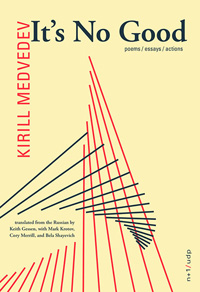Kirill Medvedev was born in Moscow in 1975. In addition to writing, he has translated, written critical essays on contemporary Russian literature and politics and their “bloody crossroads”, run his own bare bone publishing house, and organized opposition against Putin.
His first book of poems, Vse Plokho (Everything’s Bad or It’s No Good) appeared in 2000; his second book Vtorzhenie (Incursion) combined poetry and essays on subjects ranging from 9/11 to the vocabulary of pornography. Soon, thereafter, fed up with Moscow’s intellectuals acquiescence with Putin’s stabilization (or, as he might say, pacification), he went into “internal exile”—renouncing all contacts with literary life, whether publishing, readings, or roundtables or even claiming copyright for his writings. While continuing to post his poems and essays on his website and Facebook page, he has channeled his considerable energy into publishing (mainly canonical leftist criticisms of capitalism, well known in the West but not in Russia), political activity as part of the small socialist movement Forwards (Vpered) and taking to the streets to challenge Putin’s regime together with a few supporters holding handmade signs.
In It’s No Good, Keith Gessen brings together a representative sample of Medvedev’s diverse ouvre. Selections of poems from his two collections and later works as well as of his essays are preceded by Gessen’s extensive introduction to Medvedev, the poet and, equally importantly, Medvedev the critic of literature, the literary establishment, and Russia’s stunted politics. We learn how Gessen discovered Medvedev’s poetry and political writing and how it downed on him that Medvedev had very important things to say to him and to his New York friends who were trying to confront the inequities of capitalism in their own backyard. The collection, an obvious labor of love, works effectively at many levels and will surely widen the circle of Medvedev’s admirers in this country. Would it be wishful thinking that it will also, as if by ricochet, do it for Medvedev in Russia?
The form of Medvedev’s poetry is free verse, which is a bit unusual in the Russian poetic tradition (his early influence was Charles Bukowski, whom he translated). His tone is contemplative, confessional. His poems are written in contemporary colloquial language spoken by educated Russians with an occasional trespass into mat. His overarching subject is the collapse of human norms all around him. He shocks by understatement, by talking some general theme we could all relate to and then, with a slight twist, he makes us see how around us the awful, the appalling became the usual, the expected. He is also definitely a poet of Moscow, of her specific neighborhoods, streets, Metro stations, clubs and taverns.
From a poem from his first collection:
on smolensky boulevard where
five arches run one after the other
creating a very long passage…”
there, he meets a girl, a former classmate who pretends not to recognize him, causing Medvedev, in turn, to rage about girls like her like her sleeping around and marrying money, while he:
a small cheese-filled
pie
I walk past the borovitzkaya metro stop
where I sold books five years ago;
I walk further,
past the place
in front of the lenin
library
where I sold ice cream
five years ago
I walk further,
thinking about how
my poems
are the poems of an unemployed person…”
and yet, Medvedev thinks himself lucky:
why I should feel
so lucky
the luckiest
of everyone
who…”
he follows with a long list ending with:
then burned out
of everyone who found work in the morgue
of everyone who did time in jail
then died of an overdose
of everyone who worked at
the politician…campaign headquarters
and then joined his permanent team”
And here is a more recent Medvedev walking the same Moscow streets with a political message:
and go with a group of antifascists to Myasnitskaya Street, next to the Moo-Moo Café,
and while hearing people honking in the distance start heading for the center,
reach the beautiful empty square at Lubyanka,
pass by the FSB thinking about
how one day we will pass by this rotten citadel
in such a way that nothing
will be left of it…”
while the authorities don’t care, knowing that nobody cares, other than a handful of demonstrators:
to your surprise, that the guards at Lubyanka aren’t reacting at all,
and, even it seems, showing you respect…”
In the meantime, the literary establishment’s advice to poet is to: “concentrate on finding novel ways of becoming stale”.
It’s powerful stuff, Medvedev’s poetry.
A few words about Gessen’s translations—they are excellent. It might seem that speech-based free verse would be a translator’s dream. It isn’t. Speech cadences differ so much from one language to another and yet, for such poetry, they make all the difference between a poem that grabs you and a poem that stands there. Gessen succeeds brilliantly. Even where he strays, he adds and not subtracts. Describing a sordid domestic drama, Medvedev writes of “something out of Dostoevsky, with no garnish”; Gessen translates “something out of Dostoevsky with no chaser”, and it works–drinking does go with such drama much better than food.
The originals of Medvedev’s poems can be found at kirillmedvedev.narod.ru; his LifeJournal account is zoltan-partosh.livejournal.com; and you can see him reading his poetry at a recent protest rally in Moscow here.
***
Julian Berengaut was born in Warsaw, Poland where he started his university education. He continued it in Jerusalem and the US. He has published book reviews, poetry and, most recently, a novel “The Estate of Wormwood and Honey”, The Russian Estate Books, 20012.
Tags: It’s No Good, Julian Berengaut, Kirill Medvedev, ugly duckling presse


“causing Medvedev, in turn, to rage about girls like her sleeping around”
… is Medvedev a NiceGuy(TM)?
http://al.ly/qxA.
[…] really believe in the books I’m helping with, and I am not sure how to proceed. For example, Julian Berengaut’s new book, This Isn’t Easy for Me, is about to launch, and I badly want an audience for it. […]